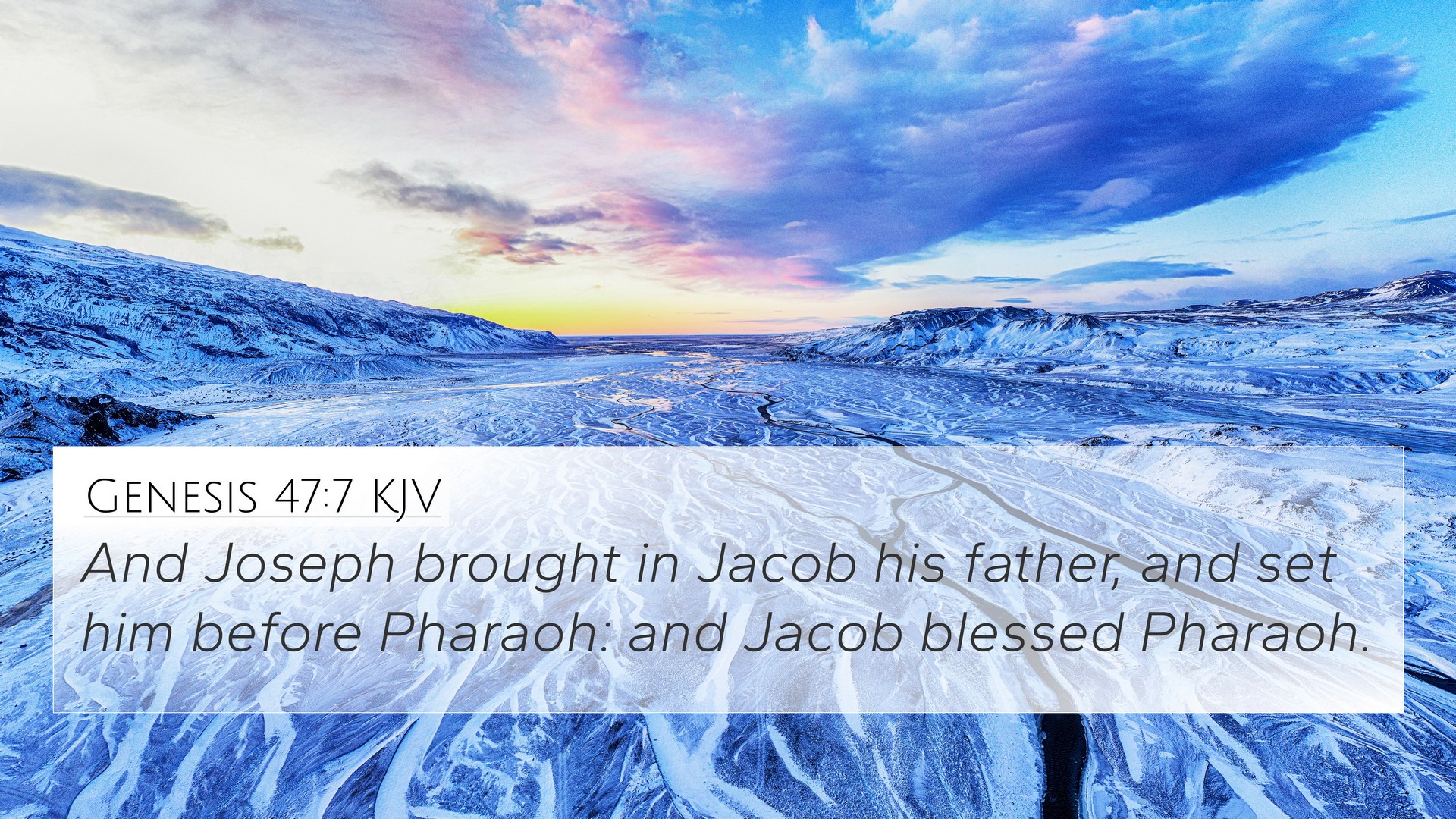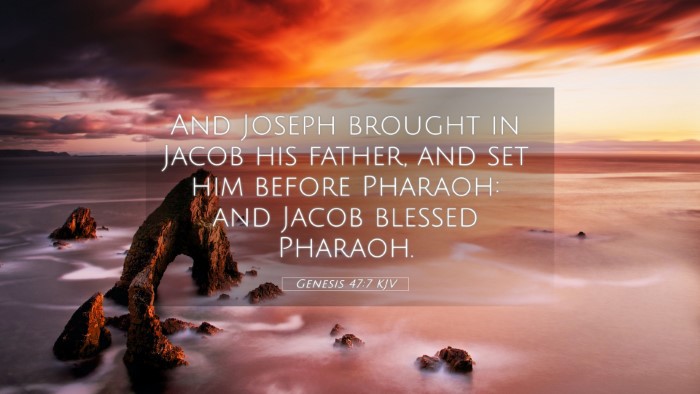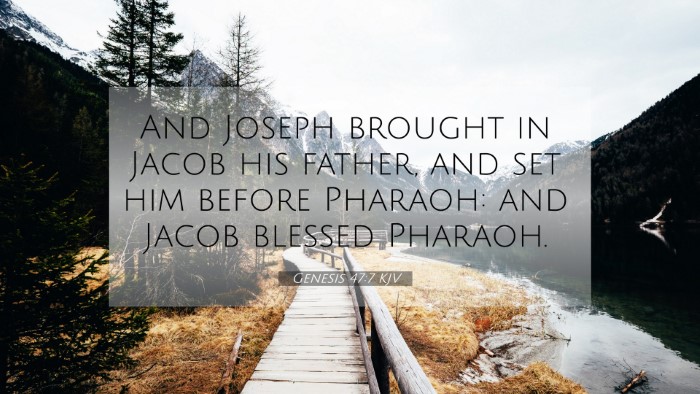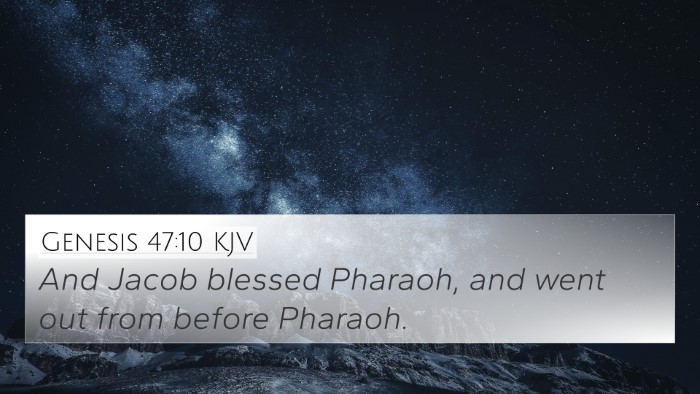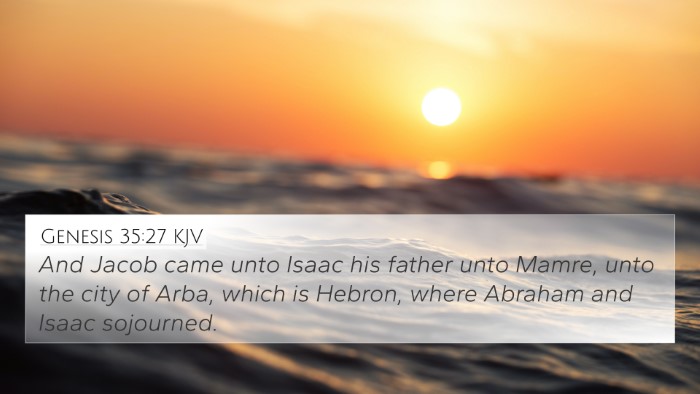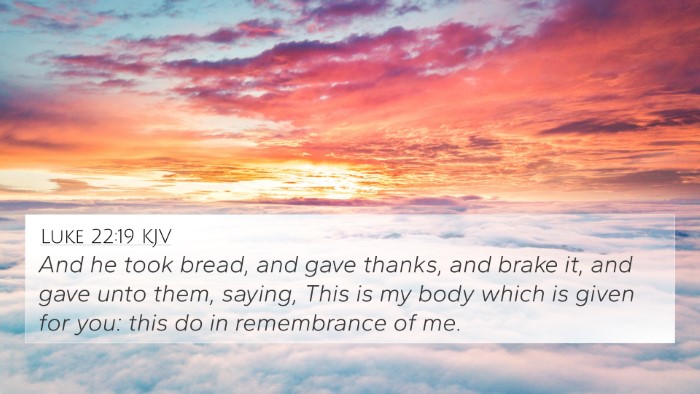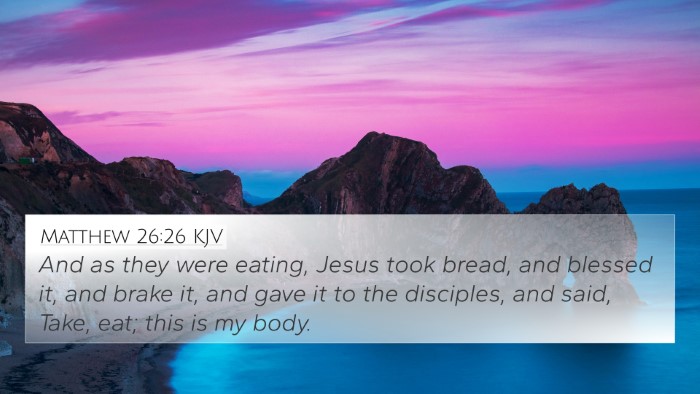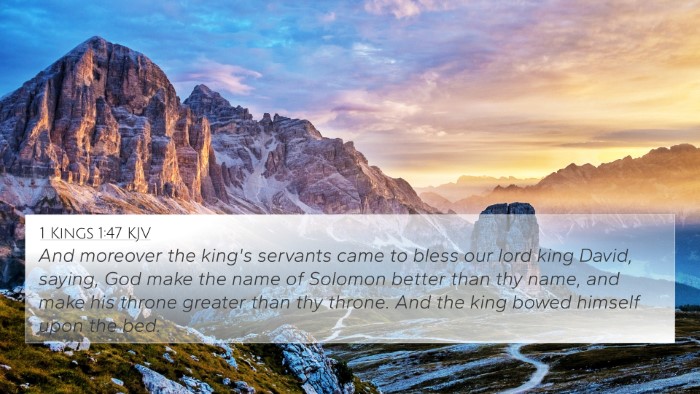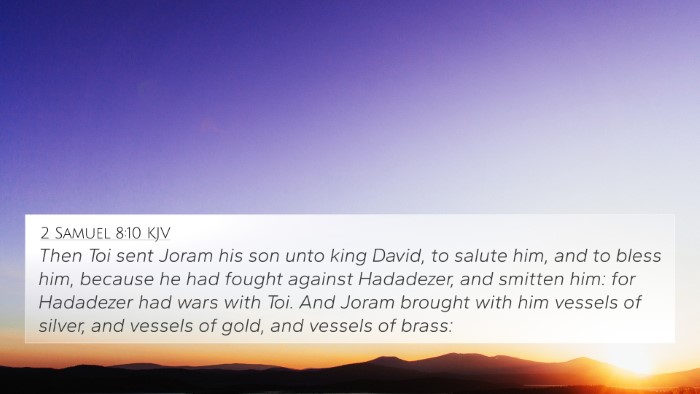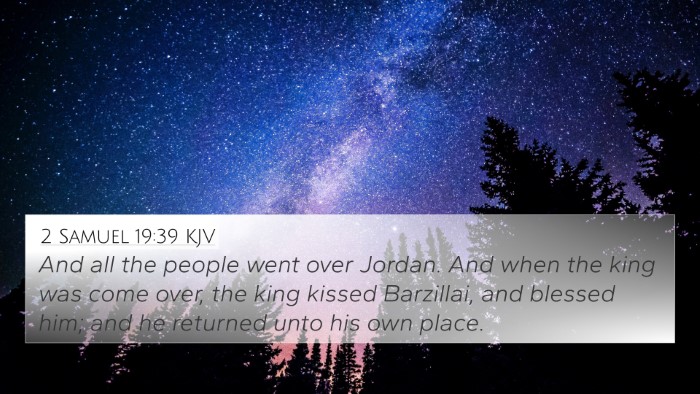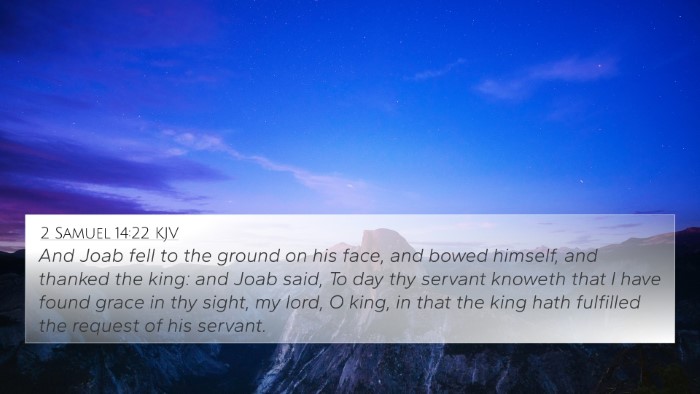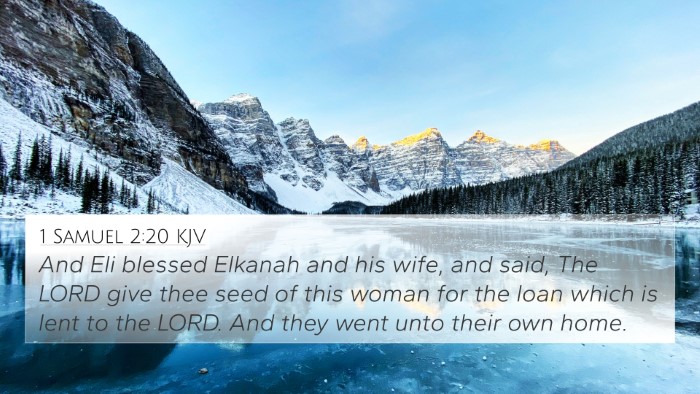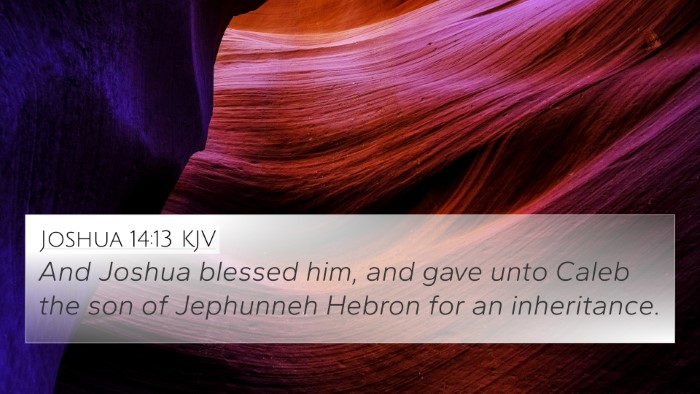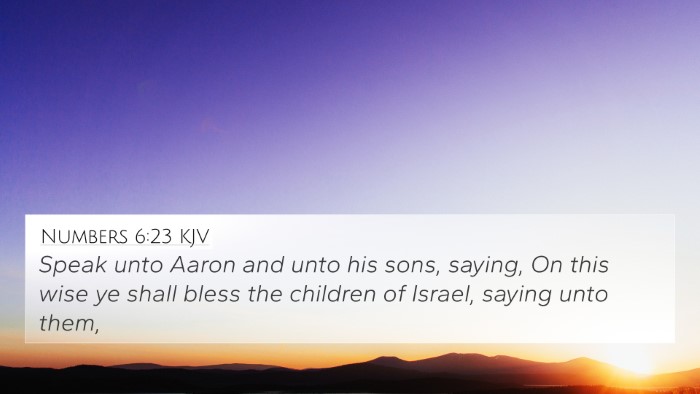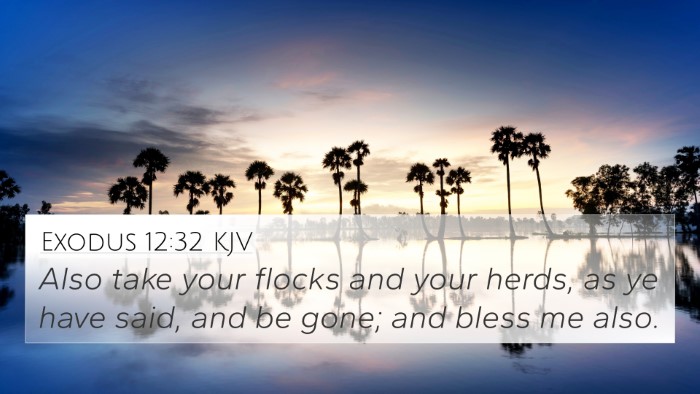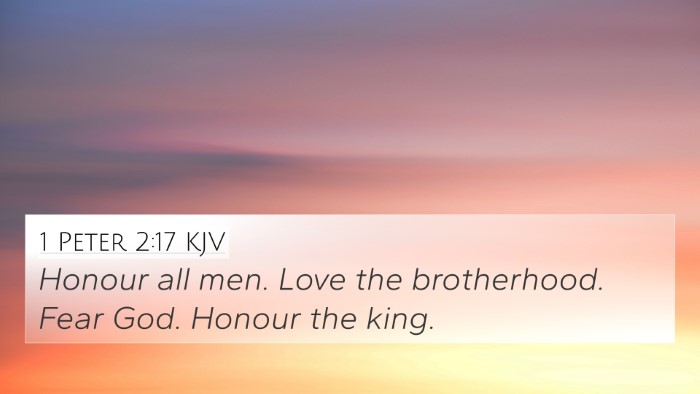Understanding Genesis 47:7
Genesis 47:7 reads: "Then Joseph brought in Jacob his father, and set him before Pharaoh: and Jacob blessed Pharaoh." This verse serves as a remarkable instance of the intersection between the lives of Joseph and Pharaoh, framed within the context of familial reunion and divine purpose.
The meaning of this verse can be unpacked through various public domain commentaries, which provide rich insights into its significance:
-
Matthew Henry's Commentary:
Henry emphasizes the importance of Jacob, being the father of Joseph, standing before Pharaoh. He notes that this act signifies not only a personal reunion but also highlights the divine providence at work in the lives of these patriarchs. Jacob’s blessing of Pharaoh illustrates the spiritual authority and patriarchal blessing that Jacob carries, despite being in a foreign land and before a powerful ruler.
-
Albert Barnes' Notes:
Barnes focuses on the historical context and the implications of Jacob’s blessing. He observes that in ancient Near Eastern cultures, blessings were significant acts, and by blessing Pharaoh, Jacob dignifies him while also establishing the spiritual significance of their encounter. This act suggests a recognition of God’s sovereignty over all nations, even those outside of Israel.
-
Adam Clarke's Commentary:
Clarke provides a detailed analysis of the grammar and context of the verse, examining the implications of Jacob’s blessing. He suggests that this moment underscores the theme of humility and respect within the narrative, with Jacob, despite his elderly state, addressing a world leader with grace and authority. Clarke also interprets this as a fulfillment of the promise of widespread influence that God had earlier assured Jacob’s family.
Key Themes and Connections
This verse encapsulates several key themes, including:
- Divine Providence: The reunion of Jacob and Joseph symbolizes God’s providential care for His people during times of hardship.
- Spiritual Authority: Jacob, as a patriarch, exercises his role as a leader by blessing Pharaoh, which reflects the biblical principle that spiritual authority transcends worldly power.
- Cross-Cultural Encounters: The interaction between a Hebrew patriarch and an Egyptian monarch illustrates the broader dialogues God facilitates among nations in the biblical narrative.
Bible Cross-References
Genesis 47:7 resonates with several other scripture passages, demonstrating intertextual connections within the Bible:
- Genesis 48:15-16 - Jacob blesses Joseph's sons, emphasizing the importance of blessings passed through generations.
- Exodus 12:48-49 - The concept of blessings and inclusion of foreigners aligns with God’s redemptive plan for all people.
- Hebrews 7:7 - This verse refers to the greater blessing of the lesser by the greater, which mirrors Jacob's action towards Pharaoh.
- Romans 11:12 - As the Gentiles are brought into the faith, the significance of blessings to the nations is echoed in Paul’s writings.
- Matthew 5:16 - Jesus teaches about letting one's light shine before others, a principle Jacob embodies by blessing Pharaoh.
- 1 Peter 2:9 - The concept of believers as a royal priesthood connects with Jacob's function as a blessing preserver.
- Acts 3:25 - The Apostle Peter recalls the blessings of the patriarchs, reinforcing the covenantal narrative that underpins biblical history.
- Isaiah 19:25 - A prophetic note on the inclusion of Egypt within God’s redemptive purpose parallels the interaction between Jacob and Pharaoh.
- Luke 2:34 - Simeon’s pronouncement over Jesus connects with themes of blessings and prophecies central to God’s plan.
- Galatians 3:14 - The connection of blessings to the nations through Abraham’s seed leads back to this moment in Genesis.
Thematic Bible Verse Connections
Further exploration of Genesis 47:7 encompasses various thematic connections across scriptures. These inter-Biblical dialogues establish a deeper understanding of God's unfolding narrative:
- Faith and Obedience: The actions of Jacob reflect a life of faith as he operates under God's directive, linking to James 2:19 regarding the belief in God alongside actions.
- Covenantal Relationships: The blessings tied to lineage remind believers of covenant promises observed in Deuteronomy 28:1-14, showcasing the blessings for obedience to God.
- Authority and Leadership: The recognition of authority in blessings can be contrasted with Romans 13:1, which discusses submission to governing authorities.
- Unity Among Believers: The familial love depicted in this verse invites comparisons to Ephesians 4:3, which calls for unity in the Spirit among Christians.
- Global Mission: Jacob’s interaction foreshadows the Great Commission in Matthew 28:19, highlighting God’s vision for nations.
Conclusion
Genesis 47:7 reveals profound insights about God's sovereignty, the importance of blessings, and the interconnectedness of biblical narratives. Using tools for Bible cross-referencing enhances one’s study of Scriptures, allowing for a deeper, more enriched understanding through examples like Jacob and Pharaoh's encounter. By examining the connections between Bible verses, believers can uncover the layers of theological meaning embedded within God's Word.
For those seeking to delve into a comparative Bible verse analysis, exploring Genesis 47:7 amid its cross-references offers a worthwhile pursuit for personal enrichment and community education.
